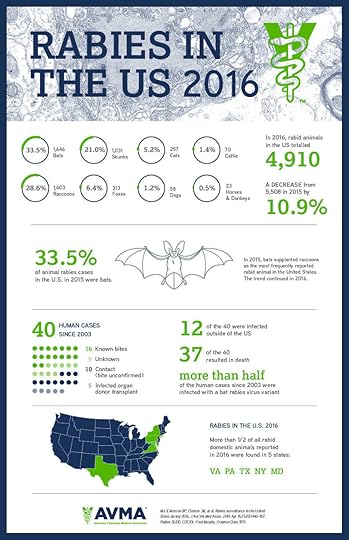why should we be concerned about rabies?
 Our veterinarians recommend we vaccinate our pets against rabies, and many American communities require such vaccines. Why should we as pet owners and community residents be concerned about rabies?
Our veterinarians recommend we vaccinate our pets against rabies, and many American communities require such vaccines. Why should we as pet owners and community residents be concerned about rabies?Potential Exposure
A friend of mine who lives in Montana can attest to the need for rabies awareness and vaccinations. Earlier this year she received a major leg injury from a dog bite. She’s not unfamiliar with dogs; in fact, she was conducting an obedience class in her town’s park when the attack happened. Turns out the dog that inflicted the injury had not been vaccinated against rabies.
“Anyone who even touches an animal – dog, cat, horse, bat, whatever – that has rabies, has to get a shot, which can cost $3,000. If the person is bitten, they basically are re-traumatized because the first shot goes into the area where the bite is – think of children who might have to go through that,” she said.
In her community, there were nine bite incidents from January to mid-August, she added. My Montana friend needs to be monitored for the next two years to insure she doesn’t contract rabies.
Although a human contracting rabies is rare, it does happen. According to the Centers for Disease Control, one to three cases of human rabies are reported each year. “The number of human rabies deaths in the United States attributed to rabies has been steadily declining since the 1970’s thanks to animal control and vaccination programs, successful outreach programs, and the availability of modern rabies biologics. Dog rabies vaccination programs have halted the natural spread of rabies among domestic dogs, which are no longer considered a rabies reservoir in the United States,” according the CDC’s website. However, the organization’s website text adds, “each year between 60 to 70 dogs and more than 250 cats are reported rabid. Nearly all these animals were unvaccinated and became infected from rabid wildlife (such as bats, raccoons, and skunks).”
I live in Wyoming, and the CDC notes that an elderly woman in the state contracted and died from rabies in 2015 through an encounter with a bat.
According to the Mayo Clinic, a human who is bitten by a rabid animal receives a series of four shots given over 14 days, plus one that’s fast-acting (rabies immune globulin) given as soon as possible after the bite. Read more here: https://www.mayoclinic.org/diseases-conditions/rabies/diagnosis-treatment/drc-20351826.
World Rabies Day
Friday, September 28 is World Rabies Day. Started 11 years ago, this special day was created to raise awareness about rabies and bring together partners to improve prevention and control efforts throughout the world. World Rabies Day is observed in many countries, including the United States. About 59,000 people die from rabies throughout the world each year, according to the CDC. Vietnam, Ethiopia, Haiti, Mexico, and India are some of the countries where people have been exposed to rabies and where the disease is still rampant not only in wild animals, but also in dogs.
According to the American Veterinary Medical Association, nearly 5,000 cases of animal rabies was reported in 2016. The disease attacks the nervous system and, once infected, death of the animal is certain. The disease passes from animal to animal (or human) when the virus is secreted via the animal’s saliva oftentimes by a bite from the infected animal. Rabies can also be transmitted when saliva from a rabid animal comes in contact with an open cut on the skin or the eyes, nose, or mouth of a person or other animal. Only mammals contract rabies. Vaccines are available for cats, dogs, ferrets, horses, cattle and sheep.
Prevention
The best way to prevent rabies in our pets to have them vaccinated. Raccoons, skunks, and bats are prone to rabies and these wild animals often come into yards and houses. Stray dogs and cats can also be transmitters of rabies, therefore, protect your beloved pet from potential contact with a stray, or unvaccinated, dog or cat. This also can help protect you and your family plus people in your community. If you travel outside the United States, learn what you need to know about rabies in other countries by visiting this website: https://wwwnc.cdc.gov/travel/yellowbook/2018/infectious-diseases-related-to-travel/rabies.
The theme for this year’s World Rabies Day is Rabies: Share the Message, Save a Life. Help educate people on the importance of rabies awareness and vaccinating pets against the disease.

Published on September 24, 2018 17:00
No comments have been added yet.



